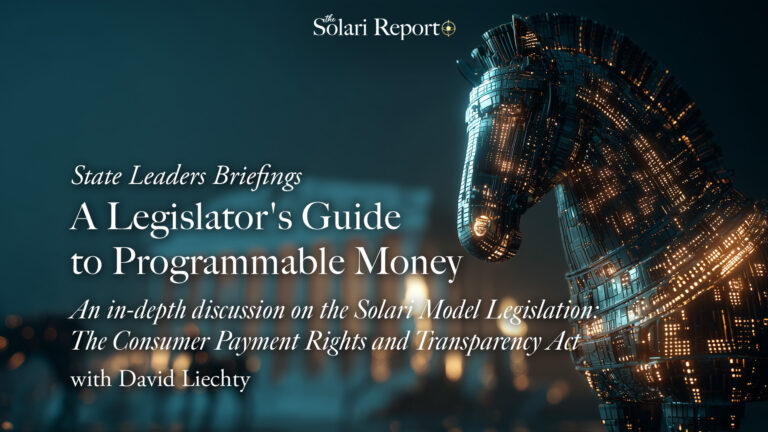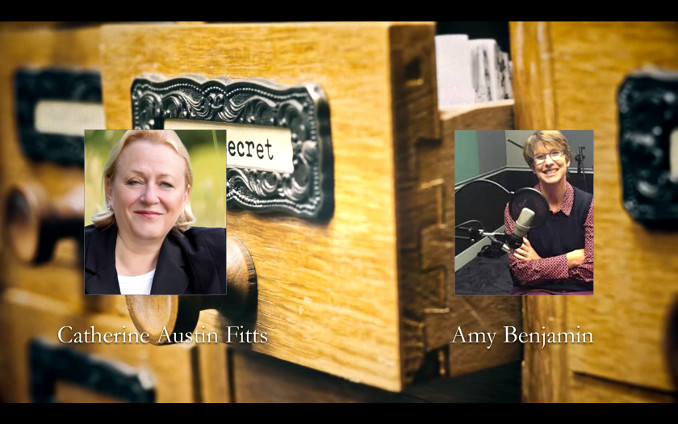“The very word ‘secrecy’ is repugnant in a free and open society; and we are as a people inherently and historically opposed to secret societies, to secret oaths, and to secret proceedings.” ~ John F. Kennedy
By Catherine Austin Fitts
Amy Benjamin’s landmark analysis “The Many Faces of Secrecy” was published in the William & Mary Policy Review in October 2017. It addresses the “systemic secrecy crisis” in the United States. Benjamin is a lecturer at the Auckland University of Technology and is a former attorney at the US Department of Justice.
Her published abstract describes her analysis as follows:
“Political secrecy in the United States has never been more studied – and less understood – than it is today. This irony is due in large part to the slippery nature of the phenomenon: Secrecy presents in different guises depending on the area of governmental activity under consideration. In the classified world of the U.S. national security state, secrecy results from affirmative governmental acts designed to enforce a sharp distinction between official and public knowledge. In the outsourced and technocratic worlds of governmental contracting and economic management, secrecy results from quiet acts of exemption of whole areas of decision-making from the normal processes of public scrutiny. Scholars have underestimated the magnitude of the political secrecy that besets American society, and misconceived prescriptions meant to manage it, because they have failed to recognize that they are dealing with the same challenge in different form across multiple disciplines.
This Article attempts to effect, for the very first time, the kind of comparing-of-notes that is needed for a proper assessment of the scope of political secrecy. It introduces a simple yet indispensable typology – direct versus indirect secrecy – that enables us to recognize the many different faces of secrecy. Once we do so we are in a position to realize that we are confronting a systemic secrecy crisis. For various reasons and under cover of conflicting rationales, large swaths of policy-making have been placed beyond the review-and-reaction authority of the American people, to the detriment of even the most humble conceptions of transparency and democracy.”
~Benjamin, Amy, The Many Faces of Secrecy (September 18, 2017). William & Mary Policy Review, Vol. 8.2 (2017) . Available at SSRN.
While I was in Auckland, I had the opportunity to interview Amy for the Solari Report. We discussed her concepts of direct and indirect secrecy and explored in detail how indirect secrecy is engineered so as to make it difficult, if not impossible, for the general population to understand what is happening around us — in the government, in the economy and the financial markets.
Indirect secrecy includes (i) monetary and fiscal policy (making sure you do not have accessible central bank and government financial disclosure so you can understand “how the money works”), (ii) outsourcing government operations and intelligence to private corporations and (iii) engineering secret agreements and transactions through international institutions.
It is a challenge to understand how so much is kept secret. Once you understand the mechanics and infrastructure, however, that engineers this growing divide between “official reality” and reality, the world we are living in today starts to make a lot more sense.
We explore how to return transparency to our governments and public discourse.
We will publish this fascinating discussion for you this coming Thursday.
In next week’s Let’s Go to the Movies I will comment on Bill Arkin’s excellent database development for the series he co-authored Top Secret America described here in his 2011 interview on Democracy Now.
Unfortunately, this searchable data has recently been taken off line.
It is the last week of the month so there is no Money & Markets. I will be flying from New Zealand to San Francisco. If you are in the Bay Area I hope to see you for our tea on the afternoon of June 2. Subscribers can sign up here.
Related Reading:
Blank Spots on the Map: The Dark Geography of the Pentagon’s Secret World by Trevor Paglen





















































































































Jason just sent to his friends:
Dear Friends,
“If there was ever a time to pay attention it’s now”. This is how Amy Benjamin ends the latest absorbing Solari interview with Catherine. It’s very rare I recommend listening to a law/economic academic but for me Amy represents the very best of Solari. Kind of like the best of Joseph Farrell, The Saker and Richard Dolan all wrapped into a precious treasure. Gold Star recommendation!
If you want to understand how the geopolitical world we live in really works this is a must listen, it’s not for novices. For me it sums up much of what Solari represents and I hope Amy becomes a regular guest. Current and on point one of my favourite interviews this year. Do I agree with everything she says of course not (QAnon is an op IMO designed by the unsavoury cousins to create apathy in Americans as part of a genius campaign to amend, instead of enforcing, the US Constitution) but 90% is pure gold.
Its long but worth every minute. By the end you may now appreciate why I support Catherine and Solari with all of my being. If you not already a Solari member you may wish to consider supporting Catherine and Solari’s amazing work by becoming a member.
Humanity is at the cross roads and bystanders will be harvested. “If ever there was a time to pay attention it’s now”.
Enjoy
Jason
Jason Bawden-Smith’s book “In the Dark” is a very important book also.
Jason just sent to his friends:
Dear Friends,
“If there was ever a time to pay attention it’s now”. This is how Amy Benjamin ends the latest absorbing Solari interview with Catherine. It’s very rare I recommend listening to a law/economic academic but for me Amy represents the very best of Solari. Kind of like the best of Joseph Farrell, The Saker and Richard Dolan all wrapped into a precious treasure. Gold Star recommendation!
If you want to understand how the geopolitical world we live in really works this is a must listen, it’s not for novices. For me it sums up much of what Solari represents and I hope Amy becomes a regular guest. Current and on point one of my favourite interviews this year. Do I agree with everything she says of course not (QAnon is an op IMO designed by the unsavoury cousins to create apathy in Americans as part of a genius campaign to amend, instead of enforcing, the US Constitution) but 90% is pure gold.
Its long but worth every minute. By the end you may now appreciate why I support Catherine and Solari with all of my being. If you not already a Solari member you may wish to consider supporting Catherine and Solari’s amazing work by becoming a member.
Humanity is at the cross roads and bystanders will be harvested. “If ever there was a time to pay attention it’s now”.
Enjoy
Jason
Jason Bawden-Smith’s book “In the Dark” is a very important book also.
Interesting thanks!
The issue of secrecy is global. In the case of Italy, it will be interesting to see what position (if any) the new euroskeptic government will take towards the Bilderberg meeting due to start here next week, with its notoriously secretive proceedings; supporters and representatives of the 5Star movement and the League have long focused on greater transparency and other issues raised by serious media channels.
Interesting thanks!
The issue of secrecy is global. In the case of Italy, it will be interesting to see what position (if any) the new euroskeptic government will take towards the Bilderberg meeting due to start here next week, with its notoriously secretive proceedings; supporters and representatives of the 5Star movement and the League have long focused on greater transparency and other issues raised by serious media channels.
Wonderful interview – courageous and intelligent discussions like this keep me going.
Hearing about Amy’s experience of “waking up” reminded me of a similar thing that happened to me.
I’d like to share a little idea that I heard years ago in relation to catching fire with an idea, etc. and then running around to set fire to everyone else’s house too in my enthusiasm: we are way-showers, not way-draggers. Remembering this has helped more than a little in keeping myself from alienating folks and yet feeling like there’s room to stand firmly in my own truth with integrity.
Yes. Hard lesson to learn for me too. Much better for everyone once I got it!
Wonderful interview – courageous and intelligent discussions like this keep me going.
Hearing about Amy’s experience of “waking up” reminded me of a similar thing that happened to me.
I’d like to share a little idea that I heard years ago in relation to catching fire with an idea, etc. and then running around to set fire to everyone else’s house too in my enthusiasm: we are way-showers, not way-draggers. Remembering this has helped more than a little in keeping myself from alienating folks and yet feeling like there’s room to stand firmly in my own truth with integrity.
Yes. Hard lesson to learn for me too. Much better for everyone once I got it!
I absolutely love the way Amy’s organized the information. These days, as I learn so much from Solari folks, i often feel like I’m in a class but didn’t take the pre-requisites. That’s not a problem generally, insofar as I just go back until I hit a level where I can gain some understanding of the subject, then I go forward. That’s not a problem as the joy of learning is not to be understated; it’s a cure for many ills.
Amy’s very clear explication of the forms and processes of secrecy render a complex subject understandable and, dare I say, transparent?
Thanks Catherine. Thanks Amy.
🙂 Great seeing you!